第四章TheMeaningsandDimensionsofCulture文化的内涵与维度国际企业与跨文化管理课件
跨文化 Unit 4

[英]Social
公与母 male & female
See
table 4.1 Not all animals or birds have specific names that denote different sex. For these animals or birds, “bull” or “cow” and “cock” or “hen” are frequently used to distinguish sex. Also, using the term “male” and “female”, or sometimes “she” with the generic name is acceptable.
西方人的思维是二元对立的,在他们的
世界里只有黑白,对错。很少有灰色地 带。但是我们中国人的思维通常比较辩 证,这样对,但是那样也可以。所以中 国人在和外国人说话的时候,外国人经 常说的是Don't beat round the bush.
Cultural thought pattern
U.S.:
all the fields except the ones in the natural sciences and applied science.
science: covers a smaller area of learning. Political science, economics, history, and sociology.
不同文化下的人的不同思维方式 See figure 4.1
英国人:直接的、线性的、直线式 闪族人:间接相关与半直接相结合 东方人:循环、迂回论证、螺旋式 罗曼人:固守的迂回 俄罗斯人:直接中又带着隐晦和迂回 西方文化多是推论演绎的论证方式 而东方文化更多倾向于把情感带入归纳式论证
跨文化-the definition of culture
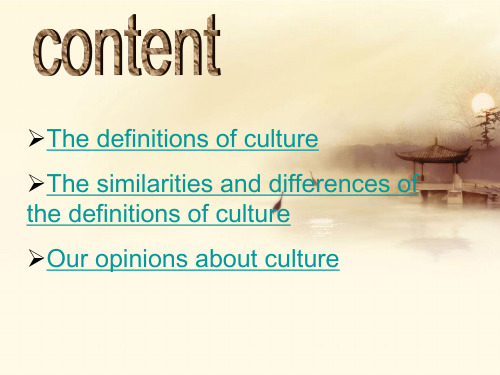
法国作家埃米勒•恩里欧(Emile Henriot,1885-1961) 认为:“文化,就是一个失去所有记忆的人尚具有的气 质(La culture, c'est ce qu'il demeure dans l'homme lorsqu'il a tout oublié)”
19世纪中叶英军指挥官拉格兰勋爵(Lord Raglan)对“文化”的定义是“粗略来说, 文化就是人类具备的而猴子所不具备的那 些特质”(“Culture is roughly anything we do and the monkeys don't)。
Our opinions
Different people have different points of view on culture. Compared to earlier before, the people’s understanding on culture just stays in one aspect of the culture. With the development of the social economy, people have a in-depth understanding of culture. For definitions of culture, generally includes spiritual and material civilization related to economic, political, institutional, ideological and other aspects. To understand the essence of culture, we still have a long way to go.
definition of culture

揭示
(1)文化是人类群体整个的生活方式和生活 过程。主要成分是符号、价值和意义、社会规 范。符号是指能够传递事物信息的一种标志, 它在生活中代表一定的信息或意义。文化的存 在取决于人类创造、使用符号的能力。价值观 是人们评判日常生活中的事物与行为的标准, 决定着社会中人们共有的区分是非的判断力。 社会规范是特定环境下的行动指南,它影响着 人们的心理、思维方式和价值取向、行动。
狭义:指意识形态所创造的精神财富,包括宗 教、信仰、风俗习惯、道德情操、学术思想、 文学艺术、科学技术、各种制度等。
文化是人类生活的反映,活动的记录,历史的积沉, 是人们对生活的需要和要求、理想和愿望,是人们的 高级精神生活。是人们认识自然,思考自己,是人精 神得以承托的框架。 她包含了一定的思想和理论,是人们对伦理、道德和 秩序的认定与遵循,是人们生活生存的方式方法与准 则。思想和理论是文化的核心、灵魂,没有思想和理 论的文化是不存在的。任何一种文化都包含有一种思 想和理论,生存的方式和方法。
5 、社会心理是人们日常的精神状态和思想面 貌,是尚未经过理论加工和艺术升华的流行的 大众心态,诸如人们的要求、愿望、情绪等 6 、社会意识形态是指经过系统加工的社会意 识,往往经由文化专家的理论归纳、逻辑整理、 艺术完善、并以著作、艺术作品等物化形态固 定下来并跨时空传播。
Hale Waihona Puke 7 、根据与社会存在关系的疏密程度,可将社会意识 形态区分为基层意识形态和高层意识形态,前者包括 政治理论、法权观念等,后者包括哲学、文学、艺术、 宗教等。 8 、基层意识形态与社会存在保持着密切联系,是经 济基础的集中体现,但它的产生和发展仍然要经过社 会心理这一中间环节起作用;高层意识形态是更高的 更远离物质经济基础的意识形态,具有较强的独立性, 但它与社会存在之间的中介是社会心理和基层意识形 态。
unit 4

干部
----a small group of people who are specially chosen and trained for a particular purpose. 骨干队伍 ----a member of this kind of group.干部 In EC, many people don’t know what it means. (not a common word) Some other substitutes: official, functionary, administrator, etc. But none of these gets exact same meaning as Chinese word “干部”.
male, female , she also acceptable male leopard, female panda, she wolf
17
副
副主席 vice-chairman 副教授 associate professor 副主任 deputy director 副秘书长 assistant secretary 副州长 lieutenant governor 副国务卿 undersecretary
Unit 4
Verbal Communication
Objectives
Learn the culturally loaded words Learn the cultural reflections on
proverbs Learn taboos Learn the differences in cultural thought patterns
2
CONTENTS
I. Warm-up cases II. Detailed Study:
大学英语跨文化复习资料

⼤学英语跨⽂化复习资料⼤学英语跨⽂化复习资料第⼀章:⽂化(1) Culture (from intercultural communication perspective): is the deposit of knowledge, experience, belief, values, actions, attitudes, hierarchies, religion, notions of time, roles, spatial relations, concepts of the universe, and artifacts acquired by a group of people in the course of generations through individual and group striving.(从跨⽂化交际学⾓度定义⽂化:⽂化是个⼈和群体在种族发展过程中所获得的知识、经验、信仰、价值观、⾏为、态度、阶级、宗教、时间观、⾓⾊、空间观、宇宙观和艺术品的集合。
)(2) Culture Identity:refers to one’s sense of belonging to a particular culture or ethnic group.(⽂化⾝份:认为⾃⼰归属于某⼀⽂化或民族群体的感觉。
)(3) Subculture: refers to a culture that exists within dominant culture, and is often based on economic or social class, ethnicity, race, or geographic region.(亚⽂化:指存在于主流⽂化中的⽂化,其划分通常基于经济地位、社会阶层、民族、种族或地理区域。
)(4) Co-culture: refers to groups or social communities exhibiting communication characteristics, perceptions, values, beliefs, and practices that are significantly different enough to distinguish them from the other groups, communities, and the dominant culture.(共⽂化:指具有独特的交际特征、感知特点、价值观、信仰和⾏为,区别于其他群体、社团以及主流⽂化的群体或社团。
霍夫斯泰德的文化维度理论 ppt课件

秘鲁、法国、智利、西班牙、阿根廷。不确定性回避程度高的国家的人民比较起来更忙碌,
常常坐立不安,喜怒形于色,积极活泼,其文化对法律、规章的需要是以情感为基础的,
这不利于产生一些根本性的革新想法,但却可以培养人们精细、守时的特质,因而善于将
别人的创意付诸实施,使之在现实生活中生效;而回避程度低的文化很有能力对付模模糊
3
2、权利距离(Power Distance)
权利距离表明一个社会能够接受组织或公司的权利在各成员之间不平等分配 的程度。权利距离与等级有关。对这个维度,各个国家由于对权力赋予的意义不 完全相同,所以也存在着很大的差异。有的文化中比较重视权威、地位、资历、 年龄等,而在有的文化中它们的重要性相对较低。比如,美国对权力的看法跟阿 拉伯国家的看法就存在很大的差异,美国不是很看重权力,他们更注重个人能力 的发挥,对权力的追求比阿拉伯国家要逊色不少;阿拉伯国家由于国家体制的关 系,注重权力的约束力,由此,阿拉伯国家的机构,不管是政府部门或者企业vidualism/Collectivism)
个人主义与集体主义(individualism/collectivism)表示个人与群体间 的关联程度。个人主义文化注重个体目标,相反,集体主义文化则更强 调集体目标。个人主义文化中,人们应当自己照顾自己和直系家庭,而 在集体主义文化中,人们期望他们的内群体或集体来照顾他们,作为这 种照顾的交换条件,他们对内群体拥有绝对的忠诚。个人主义没有圈内 (in-group)和圈外(out-group)的明显差别,而集体主义却有明显的圈 内和圈外的差别。
8
表3-2 部分国家和地区男性度指数MDI 一览表
9
在男性文化的社会里,其社会性别角色非常明确,如男人被认为总 是武断的、坚强的、注重物质成就的;而女人被认为总是更谦和、更温 柔和更关心生活质量。在女性文化的社会里,其社会性别角色是重叠的, 如男人与女人都被认为是谦和的、温柔的并都关心生活的质量(Hofstede, 1991)。在男性气质突出的国家中,社会竞争意识强烈,成功的尺度就是 财富功名,社会鼓励、赞赏工作狂,人们崇尚用一决雌雄的方式来解决 组织中的冲突问题,其文化强调公平、竞争,注重工作绩效,信奉的是 “人生是短暂的,应当快马加鞭,多出成果”,对生活的看法则是“活 着是为了工作”;而在女性气质突出的国家中,生活质量的概念更为人 们看重,人们一般乐于采取和解的、谈判的方式去解决组织中的冲突问 题,其文化强调平等、团结,人们认为人生中最重要的不是物质上的占 有,而是心灵的沟通,信奉的是“人生是短暂的,应当慢慢地、细细地 品尝”,对生活的看法则是“工作是为了生活”。
新概念英语第四册文化内涵知识点:Patterns of culture
新概念英语第四册文化内涵知识点:Patterns of culture这篇课文是关于文化研究的学术文章,是新四课文中难度的。
文化研究在西方的社会科学研究中占有重要的地位。
文化研究主要是由社会学家、人类学家进行的,但由于文化的影响无处不在,心理学系、语言学系等学科也有相关的文化研究。
尽管作者是专业的文化学家,但我们会发现,课文中并没有给出“文化”一词明确的定义。
这是因为,“文化”包罗万象,很难给出令人满意的定义。
学者RaymondWilliams认为,culture是英语中最复杂的两三个词之一。
简单来说,文化就是“风俗”,包括我们所有的社会活动,比如语言、婚嫁、礼仪、艺术等。
要透彻地理解本文,我们就必须对作者Ruth Benedict的学术立场有所了解。
Ruth Benedict被认为是20世纪秀的人类学家之一,她在文化研究上的立场是“文化相对主义”(culturalrelativism)。
文化相对主义者的观点是:研究某个社团的文化必须考虑这个社团特有的背景,文化只有相对的差异,而没有优劣之分。
了解了这一点,我们就能明白为什么课文中作者在详细论述了文化研究的重要性之后,又笔锋一转,讲到文化的研究方法。
作者在课文最后指出,如果文化研究只考察西方的文明,那就不是真正的科学研究,这正是作者文化相对主义的体现:各文化都是平等的,研究文化不应该有偏见。
这样,我们就会体会到,这部分才是课文最重要的一部分。
课文的第一段的最后一句话是:The fact of first-rate importance is the predominant role thatcustom plays in experience and in belief, and the great varieties it maymanifest.这句话是强调文化的重要性,我们在阅读时经常会不注意“varieties”这个单词,而其实这个单词也是课文的一个文眼:作者是文化相对主义者,文化有多样性的,文化不仅仅是西方文化。
understandingculturaldifferences文化维度理论课件
1 Individualism & Collectivism
2 The Power Distance Dimension
Cultural Dimensions
3 The Uncertainty Avoidance Dimension
4 The Masculinity & Femininity Dimension
Individualism & Collectivism
Answer the following question:
• Which country can be classified into the culture of individualism?
• USA, Australia, Britain, Netherland, Canada, Germany, Chinese Hong Kong, Chinese Taiwan, etc.
Individualism & Collectivism
Individualism • found in most northern
and western regions of Europe and in North America.
Collectivism • a cultural pattern
The Masculinity and Femininity Dimension
• Femininity pertains to “societies in which social gender roles overlap (i.e. both men and women are supposed to be modest, tender, and concerned with the quality of life)”.
大学英语跨文化交际 Chapter 4

Attitudinal Barriers
1.Ethnocentrism Definition • Ethnocentrism refers to negatively judging aspects of another culture by the standards of one’s own culture. • To be ethnocentric is to believe in the superiority of one’s own culture. Various forms of ethnocentric attitudes
• Uncertainty refers to our cognitive inability to explain our own or others’ feelings and behaviors in interactions because of an ambiguous situation that evokes anxiety. 不确定:不确定是指人们无法从认知的角 度去解释交际活动中自己或他人的感觉及 行为,这种认知角度解释能力的欠缺是某 种引起焦虑的含糊情境导致的。
A B
Big Bang (9’06)
2. Assuming similarity instead of difference
• It refers to the idea that people coming from another culture are more similar to you than they actually are or that another person’s situation is more similar to yours than it in fact is. 假定一致性:假定一致性是指认为来自另一文化的 他人和自己相似或他人的处境与自己的处境相似, 而事实上却并非如此。 • Assuming difference instead of similarity can cloud one’s cognition of things that cultures share in common and results in disrupted communication and even conflict.
Dimensions of Culture

Universalism vs. Particularism
Universalism: ideas/practices can be applied everywhere High universalism countries: formal rules, close adhere to business contracts (e.g., Canada, U.S., Netherlands, Germany) Particularism: circumstances dictate how ideas/practices apply; High particularism countries: often modify contracts (e.g., China, South Korea)
Individualism vs. Communitarianism Individualism: people as individuals Countries with high individualism: stress personal and individual matters; assume great personal responsibility (e.g., Canada, Thailand, U.S., Japan) Communitarianism: people regard selves as part of group Value group-related issues; committee decisions; joint responsibility (e.g., Malaysia, Korea)
Specific vs. Diffuse
Specific: large public space shared with others and small private space guarded closely High specific cultures: people open, extroverted; strong separation work and personal life (e.g., Austria, U.K., U.S.) Diffuse: public and private spaces similar size, public space guarded because shared with private space; people indirect and introverted, work/private life closely linked (e.g., Venezuela, China, Spain)
第4章 文化

三、文化的构成:
(一)符号:一群人所认可的任何能有意义地表达其自 身之外的事物的东西。 (二)价值观:由社会成员所共有的关于好与坏、对与 错、值得追求和不值得追求的观念。 (三)规范:是一种确定人们在特定情境下应该如何行 动、思想和感受的准则和标准。 (四)物质文化:一个社会普遍存在的物质形态——机 器、工具、书籍、衣服等等。它反映了其技术发展水 平、自然资源的利用及其社会需求。 。
(五)文化中心主义与文化相对主义
“文化中心主义”(ethnocentrism),亦称种族中心主义,指 各个国家、各个民族常易于将自己的生活方式、信仰、价值观、 行为规范看成是最好的,将自己的文化模式当做中心和标准,以 此衡量和评价其他文化,常常敌视和怀疑为自己所不熟悉的文化 模式。 “文化相对主义”(relativism),认为各种不同的文化模式是 不能评价和比较的,因为,如果从各种不同的文化模式所赖以生 存的环境看,每一种文化模式都有其存在的合理性,它们之间没 有优劣之分。它的口号是:好的民德就是适合当时环境的民德。
(二)主文化与亚文化
主文化:是指在社会上占主导地位的,为社会 上多数人所接受的文化。它对现存社会秩序起 着维护、支持作用。 亚文化:是指仅为社会上一部分成员所接受的 或为某一社会群体特有的文化。 二者的区分是相对的。可以相互转化。 。
亚文化的类别:
(1)民族亚文化:它是为社会中少数民族群体 所特有的文化。 (2)职业亚文化:指为各种职业群体特有的文 化。 (3)越轨亚文化:指为一些反社会集团所特有 的文化。
(二)文化的特征:
1.文化具有超生理性和超个人性。文化是后天习 得和创造的,不能通过生理遗传;文化的超个 人性,个人只有在与他人的互动中才需要文化, 接受文化,影响文化。 2.文化的复合性。文化现象不孤立存在,由多种 文化要素复合在一起。例如,电视、电影、宗 教等。 3.文化的象征性。文化具有广泛的意义,远远超 出文化现象所直接表现的那个窄小的范围。 4.文化的传递性。文化一经产生就要被他人模仿、 效法、利用。横向传递和纵向传递。
Chap004005 The Meanings and Dimensions of Culture

– In others, people identify with their occupational group, such as engineer or mechanic.
• Centralized vs. Decentralized Decision Making:
– In some societies, top managers make all important organizational decisions.
– In others, these decisions are diffused throughout the enterprise, and middle- and lower-level managers actively participate in, and make, key decisions.
. 4-9
How Culture Affects Managerial Approaches
• Informal Procedures vs. Formal Procedures:
– In some societies, much is acceans.
. 4-4
Characteristics of Culture
• Learned • Shared • Trans-generational • Symbolic • Patterned • Adaptive
. 4-5
Priorities of Cultural Values
. 4-6
跨文化-the definition of culture

Culture is like an iceberg
Culture is like an onion
Culture is our software
Culture is like the water a fish swims in7.htm 维基百科对“文化”的注解 /wiki/%E6%96%87%E5%8C%96
《现代汉语词典》把文化定义为:“人类 在社会历史发展过程中所创造的物质财富 和精神财富的总和,特指精神财富,如文 学、艺术、教育、科学等。”
人教版高中政治课本《文化生活》中将文化定 义为:文化是相对于经济、政治而言的人类全 部精神活动及其产品。包括世界观、人生观、 价值观(这是文化素养的核心)等意识形态的 部分,又包括自然科学和技术、语言等非意识 形态部分。我们的文化,不同广义的“文明”, 亦不同于狭义的“文化知识”。文化是人类特 有的现象。文化活动离不开物质载体(如书籍、 艺术品、文物等都是物质载体)。
克罗伯
克拉克洪
康德 在《判断力批判》谈到“在一个 理性生物中,一种对任意选顶的目的 (因而也就是按照他的自由选定的目的) 的有效性的产生,就是文化。”
黑格尔 认为“文化是绝对精神对自我 外化出的人的教化过程,也即绝对精神自 我认识的过程。”
《法国大百科全书》(1981年版)表述:“文化是一个 社会群体所特有的文明现象的总和。”
Greek culture Egyptian culture Chinese culture Babylon
From Intellectual Perspective
• According to the Concise Oxford Dictionary, culture is "the arts and other manifestations of human intellectual achievement regarded collectively". It refers to intellectual perspective, such as music, art, exhibition, dance, etc. When you talk about Picasso, Beethoven, etc., you are talking about culture.
the defination of culture (文化的定义)
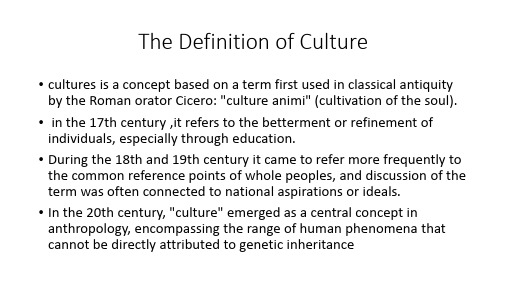
• cultures is a concept based on a term first used in classical antiquity by the Roman orator Cicero: "culture animi" (cultivation of soul). • in the 17th century ,it refers to the betterment or refinement of individuals, especially through education. • During the 18th and 19th century it came to refer more frequently to the common reference points of whole peoples, and discussion of the term was often connected to national aspirations or ideals. • In the 20th century, "culture" emerged as a central concept in anthropology, encompassing the range of human phenomena that cannot be directly attributed to genetic inheritance
• culture is the total accumulation of beliefs、customs、values、 behaviours、institutions and communication patterns that are shared,learned and passed down through the generations in an identifiable group of people . • from
胡壮麟《语言学教程》测试题及答案

胡壮麟《语言学教程》(修订版)测试题第一章:语言学导论I. Choose the best answer. (20%)1. Language is a system of arbitrary vocal symbols used for human __________.A. contactB. communicationC. relationD. community2. Which of the following words is entirely arbitrary?A. treeB. typewriterC. crashD. bang3. The function of the sentence “Water boils at 100 degrees Centigrade.” is __________.A. interrogativeB. directiveC. informativeD. performative4. In Chinese when someone breaks a bowl or a plate the host or the people present are likely to say“碎碎(岁岁)平安”as a means of controlling the forces which they believes feel might affect their lives. Which functions does it perform?A. InterpersonalB. EmotiveC. PerformativeD. Recreational5. Which of the following property of language enables language users to overcome the barriers caused by time and place, due to this feature of language, speakers of a language are free to talk about anything in any situation?A. TransferabilityB. DualityC. DisplacementD. Arbitrariness6. Study the following dialogue. What function does it play according to the functions of language?—A nice day, isn’t it?— Right! I really enjoy the sunlight.A. EmotiveB. PhaticC. PerformativeD. Interpersonal7. __________ refers to the actual realization of the ideal language user’s knowledge of the rules of his language in utterances.A. PerformanceB. CompetenceC. LangueD. Parole8. When a dog is barking, you assume it is barking for something or at someone that exists hear and now.It couldn’t be sorrowful for some lost love or lost bone. This indicates the design feature of __________.A. cultural transmissionB. productivityC. displacementD. duality9. __________ answers such questions as how we as infants acquire our first language.A. PsycholinguisticsB. Anthropological linguisticsC. SociolinguisticsD. Applied linguistics10. __________ deals with language application to other fields, particularly education.A. Linguistic theoryB. Practical linguisticsC. Applied linguisticsD. Comparative linguisticsII. Decide whether the following statements are true or false. (10%) 11. Language is a means of verbal communication. Therefore, the communication way used by the deaf-mute is not language.12. Language change is universal, ongoing and arbitrary.13. Speaking is the quickest and most efficient way of the human communication systems.14. Language is written because writing is the primary medium for all languages.15. We were all born with the ability to acquire language, which means the details of any language system can be genetically transmitted.16. Only human beings are able to communicate.17. . De Saussure, who made the distinction between langue and parole in the early 20th century, was a French linguist.18. A study of the features of the English used in Shakespeare’s time is an example of the diachronic study of language.19.Speech and writing came into being at much the same time in human history.20. All the languages in the world today have both spoken and written forms.III. Fill in the blanks. (10%)21. Language, broadly speaking, is a means of __________ communication.22. In any language words can be used in new ways to mean new things and can be combined into innumerable sentences based on limited rules. This feature is usually termed __________.23. Language has many functions. We can use language to talk about itself. This function is __________.24. Theory that primitive man made involuntary vocal noises while performing heavy work has been called the __________ theory.25. Linguistics is the __________ study of language.26. Modern linguistics is __________ in the sense that the linguist tries to discover what language is rather than lay down some rules for people to observe.27. One general principle of linguistic analysis is the primacy of __________ over writing.28.The description of a language as it changes through time is a __________ study.29.Saussure put forward two important concepts. __________ refers to the abstract linguistic system shared by all members of a speech community.30. Linguistic potential is similar to Saussure’s langue and Chomsky’s __________. IV. Explain the following terms, using examples. (20%)31. Design feature32. Displacement33. Competence34.Synchronic linguisticsV. Answer the following questions. (20%)35.Why do people take duality as one of the important design features of human language? Can you tell us what language will be if it has no such design feature?(南开大学,2004)36.Why is it difficult to define language? (北京第二外国语大学,2004)VI. Analyze the following situation. (20%)37. How can a linguist make his analysis scientific? (青岛海洋大学,1999)第二章:语音I. Choose the best answer. (20%)1. Pitch variation is known as __________ when its patterns are imposed on sentences.A. intonationB. toneC. pronunciationD. voice2. Conventionally a __________ is put in slashes (/ /).A. allophoneB. phoneC. phonemeD. morpheme3. An aspirated p, an unaspirated p and an unreleased p are __________ of the p phoneme.A. analoguesB. tagmemesC. morphemesD. allophones4. The opening between the vocal cords is sometimes referred to as __________.A. glottisB. vocal cavityC. pharynxD. uvula5. The diphthongs that are made with a movement of the tongue towards the center are known as __________ diphthongs.A. wideB. closingC. narrowD. centering6. A phoneme is a group of similar sounds called __________.A. minimal pairsB. allomorphsC. phonesD. allophones7. Which branch of phonetics concerns the production of speech sounds?A. Acoustic phoneticsB. Articulatory phoneticsC. Auditory phoneticsD. None of the above8. Which one is different from the others according to places of articulation?A. [n]B. [m]C. [ b ]D. [p]9. Which vowel is different from the others according to the characteristics of vowels?A. [i:]B. [ u ]C. [e]D. [ i ]10. What kind of sounds can we make when the vocal cords are vibrating?A. VoicelessB. VoicedC. Glottal stopD. ConsonantII. Decide whether the following statements are true or false. (10%) 11. Suprasegmental phonology refers to the study of phonological properties of units larger than the segment-phoneme, such as syllable, word and sentence.12. The air stream provided by the lungs has to undergo a number of modification to acquire the quality of a speech sound.13. Two sounds are in free variation when they occur in the same environment and do not contrast, namely,the substitution of one for the other does not produce a different word, but merely a different pronunciation.14. [p] is a voiced bilabial stop.15. Acoustic phonetics is concerned with the perception of speech sounds.16. All syllables must have a nucleus but not all syllables contain an onset and a coda.17. When pure vowels or monophthongs are pronounced, no vowel glides take place.18. According to the length or tenseness of the pronunciation, vowels can be divided into tense vs. lax or long vs. short.19. Received Pronunciation is the pronunciation accepted by most people.20. The maximal onset principle states that when there is a choice as to where to placea consonant, it is put into the coda rather than the onset.III. Fill in the blanks. (20%)21. Consonant sounds can be either __________ or __________, while all vowel sounds are __________.22. Consonant sounds can also be made when two organs of speech in the mouth are brought close together so that the air is pushed out between them, causing__________.23. The qualities of vowels depend upon the position of the __________ and the lips.24. One element in the description of vowels is the part of the tongue which is at the highest point in the mouth. A second element is the __________ to which that part of the tongue is raised.25. Consonants differ from vowels in that the latter are produced without__________.26.In phonological analysis the words fail / veil are distinguishable simply because of the two phonemes /f/ - /v/. This is an example for illustrating __________.27. In English there are a number of __________, which are produced by moving from one vowel position to another through intervening positions.28. __________ refers to the phenomenon of sounds continually show the influence of their neighbors.29. __________ is the smallest linguistic unit.30. Speech takes place when the organs of speech move to produce patterns of sound. These movements have an effect on the __________ coming from the lungs.IV. Explain the following terms, using examples. (20%)31. Sound assimilation32. Suprasegmental feature33. Complementary distribution34. Distinctive featuresV. Answer the following questions. (20%)35. What is acoustic phonetics?(中国人民大学,2003)36. What are the differences between voiced sounds and voiceless sounds in terms of articulation?(南开04)VI. Analyze the following situation. (20%)37. Write the symbol that corresponds to each of the following phonetic descriptions; then give an English word that contains this sound. Example: voiced alveolar stop [d] dog. (青岛海洋大学,1999)(1) voiceless bilabial unaspirated stop(2) low front vowel(3) lateral liquid(4) velar nasal(5) voiced interdental fricative第三章:词汇I. Choose the best answer. (20%)1. Nouns, verbs and adjectives can be classified as __________.A. lexical wordsB. grammatical wordsC. function wordsD. form words2. Morphemes that represent tense, number, gender and case are called __________ morpheme.A. inflectionalB. freeC. boundD. derivational3. There are __________ morphemes in the word denationalization.A. threeB. fourC. fiveD. six4. In English –ise and –tion are called __________.A. prefixesB. suffixesC. infixesD. stems5. The three subtypes of affixes are: prefix, suffix and __________.A. derivational affixB. inflectional affixC. infixD. back-formation6. __________ is a way in which new words may be formed from already existing words by subtracting an affix which is thought to be part of the old word.A. affixationB. back-formationC. insertionD. addition7. The word TB is formed in the way of __________.A. acronymyB. clippingC. initialismD. blending8. The words like comsat and sitcom are formed by __________.A. blendingB. clippingC. back-formationD. acronymy9. The stem of disagreements is __________A. agreementB. agreeC. disagreeD. disagreement10. All of them are meaningful except for __________.A. lexemeB. phonemeC. morphemeD. allomorphII. Decide whether the following statements are true or false. (10%) 11. Phonetically, the stress of a compound always falls on the first element, while the second element receives secondary stress.12. Fore as in foretell is both a prefix and a bound morpheme.13. Base refers to the part of the word that remains when all inflectional affixes are removed.14. In most cases, prefixes change the meaning of the base whereas suffixes change the word-class of the base.15. Conversion from noun to verb is the most productive process of a word.16. Reduplicative compound is formed by repeating the same morpheme of a word.17. The words whimper, whisper and whistle are formed in the way of onomatopoeia.18. In most cases, the number of syllables of a word corresponds to the number of morphemes.19. Back-formation is a productive way of word-formations.20. Inflection is a particular way of word-formations.III. Fill in the blanks. (20%)21. An __________ is pronounced letter by letter, while an __________ is pronounced as a word.22. Lexicon, in most cases, is synonymous with __________.23. Orthographically, compounds are written in three ways: __________, __________ and __________.24. All words may be said to contain a root __________.25. A small set of conjunctions, prepositions and pronouns belong to __________ class, while the largest part of nouns, verbs, adjectives and adverbs belongs to__________ class.26. __________ is a reverse process of derivation, and therefore is a process of shortening.27. __________ is extremely productive, because English had lost most of its inflectional endings by the end of Middle English period, which facilitated the use of words interchangeably as verbs or nouns, verbs or adjectives, and vice versa.28. Words are divided into simple, compound and derived words on the __________ level.29. A word formed by derivation is called a __________, and a word formed by compounding is called a__________.30. Bound morphemes are classified into two types: __________ and __________. IV. Explain the following terms, using examples. (20%)31. Blending32. Allomorph33. Closed-class word34. Morphological ruleV. Answer the following questions. (20%)35. How many types of morphemes are there in the English language? What are they? (厦门大学,2003)36. What are the main features of the English compounds?VI. Analyze the following situation. (20%)37. Match the terms under COLUMN I with the underlined forms from COLUMN II (武汉大学,2004)I II(1) acronym a. foe(2) free morpheme b. subconscious(3) derivational morpheme c. UNESCO(4) inflectional morpheme d. overwhelmed(5) prefix e. calculation第四章:句法I. Choose the best answer. (20%)1. The sentence structure is ________.A. only linearB. only hierarchicalC. complexD. both linear and hierarchical2. The syntactic rules of any language are ____ in number.A. largeB. smallC. finiteD. infinite3. The ________ rules are the rules that group words and phrases to form grammatical sentences.A. lexicalB. morphologicalC. linguisticD. combinational4. A sentence is considered ____ when it does not conform to the grammatical knowledge in the mind of native speakers.A. rightB. wrongC. grammaticalD. ungrammatical5. A __________ in the embedded clause refers to the introductory word that introduces the embedded clause.A. coordinatorB. particleC. prepositionD. subordinator6. Phrase structure rules have ____ properties.A. recursiveB. grammaticalC. socialD. functional7. Phrase structure rules allow us to better understand _____________.A. how words and phrases form sentences.B. what constitutes the grammaticality of strings of wordsC. how people produce and recognize possible sentencesD. all of the above.8. The head of the phrase “the city Rome” is __________.A. the cityB. RomeC. cityD. the city Rome9. The phrase “on the shelf” be longs to __________ construction.A. endocentricB. exocentricC. subordinateD. coordinate10. The sentence “They were wanted to remain quiet and not to expose themselves.” is a __________sentence.A. simpleB. coordinateC. compoundD. complexII. Decide whether the following statements are true or false. (10%) 11. Universally found in the grammars of all human languages, syntactic rules that comprise the system of internalized linguistic knowledge of a language speaker are known as linguistic competence.12. The syntactic rules of any language are finite in number, but there is no limit to the number of sentences native speakers of that language are able to produce and comprehend.13. In a complex sentence, the two clauses hold unequal status, one subordinating the other.14. Constituents that can be substituted for one another without loss of grammaticality belong to the same syntactic category.15. Minor lexical categories are open because these categories are not fixed and new members are allowed for.16. In English syntactic analysis, four phrasal categories are commonly recognized and discussed, namely, noun phrase, verb phrase, infinitive phrase, and auxiliary phrase.17. In English the subject usually precedes the verb and the direct object usually follows the verb.18. What is actually internalized in the mind of a native speaker is a complete list of words and phrases rather than grammatical knowledge.19. A noun phrase must contain a noun, but other elements are optional.20. It is believed that phrase structure rules, with the insertion of the lexicon, generate sentences at the level of D-structure.III. Fill in the blanks. (20%)21. A __________ sentence consists of a single clause which contains a subject and a predicate and stands alone as its own sentence.22. A __________ is a structurally independent unit that usually comprises a number of words to form a complete statement, question or command.23. A __________ may be a noun or a noun phrase in a sentence that usually precedes the predicate.24. The part of a sentence which comprises a finite verb or a verb phrase and which says something about the subject is grammatically called __________.25. A __________ sentence contains two, or more, clauses, one of which is incorporated into the other.26. In the complex sentence, the incorporated or subordinate clause is normally called an __________clause.27. Major lexical categories are __________ categories in the sense that new words are constantly added.28. __________ condition on case assignment states that a case assignor and a case recipient should stay adjacent to each other.29. __________ are syntactic options of UG that allow general principles to operate in one way or another and contribute to significant linguistic variations between andamong natural languages.30. The theory of __________ condition explains the fact that noun phrases appear only in subject and object positions.IV. Explain the following terms, using examples. (20%)31. Syntax32. IC analysis33. Hierarchical structure34. Trace theoryV. Answer the following questions. (20%)35. What are endocentric construction and exocentric construction? (武汉大学,2004)36. Distinguish the two possible meanings of “more beautiful flowers” by means of IC analysis. (北京二外国语大学,2004)VI. Analyze the following situation. (20%)37. Draw a tree diagram according to the PS rules to show the deep structure of the sentence:The student wrote a letter yesterday.第五章:意义I. Choose the best answer. (20%)1. The naming theory is advanced by ________.A. PlatoB. BloomfieldC. Geoffrey LeechD. Firth2.“We shall know a word by the company it keeps.” This statement represents_______.A. the conceptualist viewB. contexutalismC. the naming theoryD. behaviorism3. Which of the following is NOT true?A. Sense is concerned with the inherent meaning of the linguistic form.B. Sense is the collection of all the features of the linguistic form.C. Sense is abstract and decontextualized.D. Sense is the aspect of meaning dictionary compilers are not interested in.4. “Can I borrow your bike?”_______ “You have a bike.”A. is synonymous withB. is inconsistent withC. entailsD. presupposes5. ___________ is a way in which the meaning of a word can be dissected into meaning components,called semantic features.A. Predication analysisB. Componential analysisC. Phonemic analysisD. Grammatical analysis6. “Alive” and “dead” are ______________.A. gradable antonymsB. relational antonymsC. complementary antonymsD. None of the above7. _________ deals with the relationship between the linguistic element and thenon-linguistic world of experience.A. ReferenceB. ConceptC. SemanticsD. Sense8. ___________ refers to the phenomenon that words having different meanings have the same form.A. PolysemyB. SynonymyC. HomonymyD. Hyponymy9. Words that are close in meaning are called ______________.A. homonymsB. polysemiesC. hyponymsD. synonyms10. The grammaticality of a sentence is governed by _______.A. grammatical rulesB. selectional restrictionsC. semantic rulesD. semantic featuresII. Decide whether the following statements are true or false. (10%) 11. Dialectal synonyms can often be found in different regional dialects such as British English and American English but cannot be found within the variety itself, for example, within British English or American English.12. Sense is concerned with the relationship between the linguistic element and the non-linguistic world of experience, while the reference deals with the inherent meaning of the linguistic form.13. Linguistic forms having the same sense may have different references in different situations.14. In semantics, meaning of language is considered as the intrinsic and inherent relation to the physical world of experience.15. Contextualism is based on the presumption that one can derive meaning from or reduce meaning to observable contexts.16. Behaviorists attempted to define the meaning of a language form as the situation in which the speaker utters it and the response it calls forth in the hearer.17. The meaning of a sentence is the sum total of the meanings of all its components.18. Most languages have sets of lexical items similar in meaning but ranked differently according to their degree of formality.19. “It is hot.” is a no-place predication because it contains no argument.20. In grammatical analysis, the sentence is taken to be the basic unit, but in semantic analysis of a sentence, the basic unit is predication, which is the abstraction of the meaning of a sentence.III. Fill in the blanks. (20%)21. __________ can be defined as the study of meaning.22. The conceptualist view holds that there is no __________ link between a linguistic form and what it refers to.23. __________ means what a linguistic form refers to in the real, physical world; it deals with the relationship between the linguistic element and the non-linguistic world of experience.24. Words that are close in meaning are called __________.25. When two words are identical in sound, but different in spelling and meaning, they are called__________.26. __________ opposites are pairs of words that exhibit the reversal of a relationship between the two items.27. __________ analysis is based upon the belief that the meaning of a word can be divided into meaning components.28. Whether a sentence is semantically meaningful is governed by rules called__________ restrictions, which are constraints on what lexical items can go with what others.29. A(n) __________ is a logical participant in a predication, largely identical with the nominal element(s)in a sentence.30. According to the __________ theory of meaning, the words in a language are taken to be labels of the objects they stand for.IV. Explain the following terms, using examples. (20%)31. Entailment32. Proposition33. Componential analysis34. ReferenceV. Answer the following questions. (20%)35. What are the sense relations between the following groups of words?Dogs, cats, pets, parrots; trunk, branches, tree, roots (青岛海洋大学,1999)36. What are the three kinds of antonymy? (武汉大学,2004)VI. Analyze the following situation. (20%)37. For each group of words given below, state what semantic property or properties are shared by the (a) words and the (b) words, and what semantic property or properties distinguish between the classes of (a)words and (b) words.(1) a. bachelor, man, son, paperboy, pope, chiefb. bull, rooster, drake, ram(2) a. table, stone, pencil, cup, house, ship, carb. milk, alcohol, rice, soup(3) a. book, temple, mountain, road, tractorb. idea, love, charity, sincerity, bravery, fear (青岛海洋大学,1999)第七章:语言、文化和社会[注:第六章无测试题]I. Choose the best answer. (20%)1. _______ is concerned with the social significance of language variation and language use in different speech communities.A. PsycholinguisticsB. SociolinguisticsC. Applied linguisticsD. General linguistics2. The most distinguishable linguistic feature of a regional dialect is its __________.A. use of wordsB. use of structuresC. accentD. morphemes3. __________ is speech variation according to the particular area where a speaker comes from.A. Regional variationB. Language variationC. Social variationD. Register variation4. _______ are the major source of regional variation of language.A. Geographical barriersB. Loyalty to and confidence in one’s native speechC. Physical discomfort and psychological resistance to changeD. Social barriers5. _________ means that certain authorities, such as the government choose, a particular speech variety, standardize it and spread the use of it across regional boundaries.A. Language interferenceB. Language changesC. Language planningD. Language transfer6._________ in a person’s speech or writing usually ranges on a continuu m from casual or colloquial to formal or polite according to the type of communicative situation.A. Regional variationB. Changes in emotionsC. Variation in connotationsD. Stylistic variation7. A ____ is a variety of language that serves as a medium of communication among groups of people for diverse linguistic backgrounds.A. lingua francaB. registerC. CreoleD. national language8.Although _______ are simplified languages with reduced grammatical features, they are rule-governed, like any human language.A. vernacular languagesB. creolesC. pidginsD. sociolects9. In normal situations, ____ speakers tend to use more prestigious forms than their____ counterparts with the same social background.A. female; maleB. male; femaleC. old; youngD. young; old10. A linguistic _______ refers to a word or expression that is prohibited by the “polite” society from general use.A. slangB. euphemismC. jargonD. tabooII. Decide whether the following statements are true or false. (10%) 11. Language as a means of social communication is a homogeneous system with a homogeneous group of speakers.12. The goal of sociolinguistics is to explore the nature of language variation and language use among a variety of speech communities and in different social situations.13. From the sociolinguistic perspective, the term “speech variety” can n ot be used to refer to standard language, vernacular language, dialect or pidgin.14. The most distinguishable linguistic feature of a regional dialect is its grammar and uses of vocabulary.15. A person’s social backgrounds do not exert a shaping influence on his choice of linguistic features.16. Every speaker of a language is, in a stricter sense, a speaker of a distinct idiolect.17. A lingua franca can only be used within a particular country for communication among groups of people with different linguistic backgrounds.18. A pidgin usually reflects the influence of the higher, or dominant, language in its lexicon and that of the lower language in their phonology and occasionally syntax.19. Bilingualism and diglossia mean the same thing.20. The use of euphemisms has the effect of removing derogatory overtones and the disassociative effect as such is usually long-lasting.III. Fill in the blanks. (20%)21. The social group isolated for any given study is called the speech __________.22. Speech __________ refers to any distinguishable form of speech used by a speaker or group of speakers.23. From the sociolinguistic perspective, a speech variety is no more than a__________ variety of a language.24. Language standardization is also called language __________.25. Social variation gives rise to __________ which are subdivisible into smaller speech categories that reflect their socioeconomic, educational, occupational background, etc.26.__________ variation in a person’s speech or writing usually range s on a continuum from casual or colloquial to formal or polite according to the type of communicative situation.27. A regional dialect may gain status and become standardized as the national or。
(完整word版)大学英语跨文化复习重点

(完整word版)大学英语跨文化复习重点Chapter 1 CultureI.定义Culture(from intellectual perspective):从知性角度定义文化:作为整体的人类智力成就的艺术和其他表现Culture(from anthropologic perspective):从人类学角度定义文化:文化有清晰和模糊的行为模式构成,这些模式通过符号获得并传播,这些符号有人类群体的特别成就构成,包括具体的人工制品。
文化的基本核心由传统思想和与其相关的价值观构成。
Culture(from psychological perspective) : 从心理学角度定义文化:文化是使一个人类群体成员区别于其他人类群体的思维的总体规划。
Culture(from sociological perspective): 从社会学角度定义文化:文化是一种可习得的,基于群体的认知模式——包括言语与非言语符号,态度,价值观,信仰和非信仰系统以及行为。
Culture(from intercultural communication perspective): 从跨文化交际学角度定义文化:文化是个人和群体在种族发展过程中所获得的知识,经验,信仰,价值观,行为,态度,阶级,宗教,时间观,角色,空间观和艺术品的集合。
Culture Identity: 文化身份:认为自己归属于某一文化或民族群体的感觉。
Subculture亚文化:指存在于主流文化中的文化,其划分通常基于经济地位,社会阶层,民族,种族或地理区域。
Co-culture 共文化——指具有独特的交际特征,感知特点,价值观,信仰和行为,区别于其他群体,社团以及主流文化的群体或社团。
Subgroup 亚群体——相对于亚文化和共文化群体,亚群体通常规模不大,也不一定有文化群体时代相传积累的价值观念和行为模式。
Chapter 2 Communication and Intercultural Communication1. Sender/Source信息发出者/信息源:指传递信息的人2. Message信息:只引起信息接受者反应的任何信号。
文化的定义(中英文)
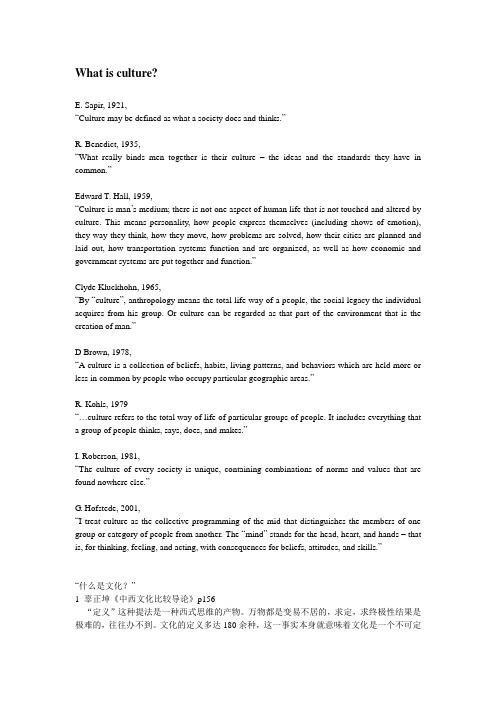
What is culture?E. Sapir, 1921,“Culture may be defined as what a society does and thinks.”R. Benedict, 1935,“What really binds men together is their culture –the ideas and the standards they have in common.”Edward T. Hall, 1959,“Culture is man’s medium; there is not one aspect of human life that is not touched and altered by culture. This means personality, how people express themselves (including shows of emotion), they way they think, how they move, how problems are solved, how their cities are planned and laid out, how transportation systems function and are organized, as well as how economic and government systems are put together and function.”Clyde Kluckhohn, 1965,“By “culture”, anthropology means the total life way of a people, the social legacy the individual acquires from his group. Or culture can be regarded as that part of the environment that is the creation of man.”D Brown, 1978,“A culture is a collection of beliefs, habits, living patterns, and behaviors which are held more or less in common by people who occupy particular geographic areas.”R. Kohls, 1979“…culture refers to the total way of life of particular groups of people. It includes everything that a group of people thinks, says, does, and makes.”I. Roberson, 1981,“The culture of every society is unique, containing combinations of norms and values that are found nowhere else.”G. Hofstede, 2001,“I treat culture as the collective programming of the mid that distinguishes the members of one group or category of people from another. The “mind” stands for the head, heart, and hands – that is, for thinking, feeling, and acting, with consequences for beliefs, attitudes, and skills.”“什么是文化?”1 辜正坤《中西文化比较导论》p156“定义”这种提法是一种西式思维的产物。
Chapter 1 the meanings and dimensions of culture
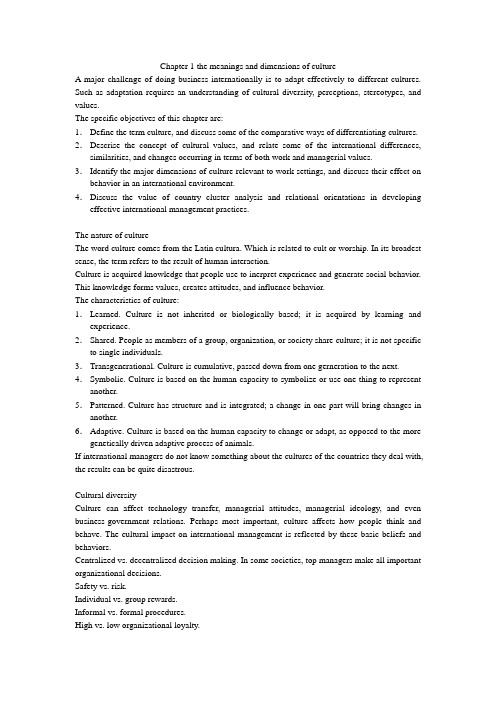
Chapter 1 the meanings and dimensions of cultureA major challenge of doing business internationally is to adapt effectively to different cultures. Such as adaptation requires an understanding of cultural diversity, perceptions, stereotypes, and values.The specific objectives of this chapter are:1.Define the term culture, and discuss some of the comparative ways of differentiating cultures. 2.Descrise the concept of cultural values, and relate some of the international differences, similarities, and changes occurring in terms of both work and managerial values.3.Identify the major dimensions of culture relevant to work settings, and discuss their effect on behavior in an international environment.4.Discuss the value of country cluster analysis and relational orientations in developing effective international management practices.The nature of cultureThe word culture comes from the Latin cultura. Which is related to cult or worship. In its broadest sense, the term refers to the result of human interaction.Culture is acquired knowledge that people use to inerpret experience and generate social behavior. This knowledge forms values, creates attitudes, and influence behavior.The characteristics of culture:1.Learned. Culture is not inherited or biologically based; it is acquired by learning and experience.2.Shared. People as members of a group, organization, or society share culture; it is not specific to single individuals.3.Transgenerational. Culture is cumulative, passed down from one gerneration to the next. 4.Symbolic. Culture is based on the human capacity to symbolize or use one thing to represent another.5.Patterned. Culture has structure and is integrated; a change in one part will bring changes in another.6.Adaptive. Culture is based on the human capacity to change or adapt, as opposed to the more genetically driven adaptive process of animals.If international managers do not know something about the cultures of the countries they deal with, the results can be quite disastrous.Cultural diversityCulture can affect technology transfer, managerial attitudes, managerial ideology, and even business-government relations. Perhaps most important, culture affects how people think and behave. The cultural impact on international management is reflected by these basic beliefs and behaviors.Centralized vs. decentralized decision making. In some societies, top managers make all important organizational decisions.Safety vs. risk.Individual vs. group rewards.Informal vs. formal procedures.High vs. low organizational loyalty.Cooperation vs. competition.Short term vs. long term horizonsStability vs. innovation.Another way of depciting cultural diversity is through concentric circles. The best way to test if something is a basic assumption is when the situation provokes confusion or irritation.Values in cultureValue are basic convictions that people have regarding what is right and wrong, good and bad, important and unimportant. These values are learned from the culture in which the individual is reared, and they help to direct the person’s behavior.Value differences and similaities across culturesDifferences in work values also have been found to reflect culture and industrialization. At the same time, value similarities exist between cultures. In fact, research shows that managers from different countries often have similar personal values that relate to success.1.there is a reasonably strong relationship between the level of success achieved by managersand their personal values.2.it is evident that value patterns predict managerial success and could be used in selection andplacement decisions3.although there are country differences in the relationships between values and success,findings across the four countries are quite similar4.the general pattern indicates that more successful managers appear to favor pragmatic,dynamic, achievement-oriented values, while less successful managers prefer more static and passive values.Values in transitionDo values change over time? George England found that personal value systems are relatively stable and do not change rapidly. However, changes are taking place in managerial values as aresult of bot culture and technology. An example examined the effects of the U.S. environment on the cultural values of Japanese managers working for Japanese firms in the United States.1.lifetime employment is widely accepted in Japanese culture. But the stateside Japanesemanagers did not believe that unconditional tenure in one organization was of major importance. They did believe, however , that job security was important.2.formal authority, obedience, and conformance to hierarchic position are very important inJapan, but the stateside managers did not perceive obedience and confromity to be very important and rejected the idea that one should not questiona superior. However, they did support the concept of formal authority.3.group orientation, cooperation, conformity, and compromise are important organiztaionalvaues in Japan. The stateside managers supported these values but also believed it was important to be an individual, thus maintaining a balance between a group and a personal orientation.4.in Japan, organizational personnel often are rewarded based on seniority, not merit. Supportfor this value was directly influenced by the length of time the Japanese manageres had been in the U.S.. the longer they had been there, the lower their support for this value.5.paternalism, often measured by a manager’s involvement in both personal and off-the-jobproblems of subordinates, is very important in Japan. Stateside Japanese managers disagreed, and this resistance was positively associated with the number of years they had been in the U.S.Hofstede’s cultural dimensions1. Power Dimension2. Individualism3. Masculinity4. Uncertainty Avoidance5. Long term vs short term Orientation (Bond)Power distance:The extent to which less powerful members of institutions and organizations accept that power is distributed unequally.权力距离大小在组织结构中会有较明显的表现。
第四章TheMeaningsandDimensionsofCulture文化的内涵与维度国际企业与跨文化管理课件
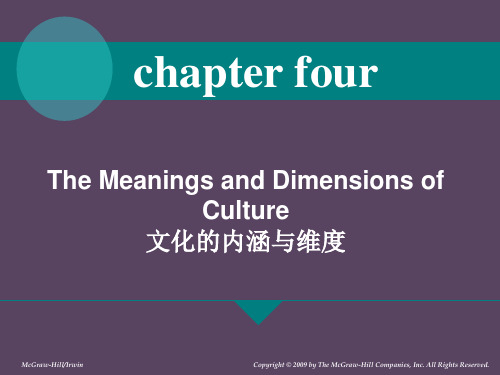
How Culture Affects Managerial Approaches
• Safety vs. Risk: • 安全与风险
– In some societies, organizational decision makers are risk averse and have great difficulty with conditions of uncertainty. – 在一些社会中,组织决策这就厌恶风险,难以应付 不确定的环境; – In others, risk taking is encouraged, and decision making under uncertainty is common. – 在其他一些社会中,就鼓励冒险,在不确定的环境 下决策也十分常见。
chapter four
The Meanings and Dimensions of Culture 文化的内涵与维度
McGraw-Hill/Irwin
Copyright © 2009 by The McGraw-Hill Companies, Inc. All Rights Reserved.
Chapter Objectives 学习目标
4-15
Values in Culture 文化中的价值观
• Values价值观
– Learned from culture in which individual is reared 来自于人们所扎根的文化 – Differences in cultural values may result in varying management practices 不同的价值观导致了不同的管理实践 – Basic convictions that people have about 人们所持的基本信念 • Right and wrong 正确与错误 • Good and bad 好与坏 • Important and unimportant 重要与不重要
- 1、下载文档前请自行甄别文档内容的完整性,平台不提供额外的编辑、内容补充、找答案等附加服务。
- 2、"仅部分预览"的文档,不可在线预览部分如存在完整性等问题,可反馈申请退款(可完整预览的文档不适用该条件!)。
- 3、如文档侵犯您的权益,请联系客服反馈,我们会尽快为您处理(人工客服工作时间:9:00-18:30)。
How Culture Affects Managerial Approactability vs. Innovation 稳定与创新
– The culture of some countries encourages stability and resistance to change. 一些国家更注重稳定,反对变革 – The culture of others puts high value on innovation and change. 在另一些国家更注重创新和变革
– In some societies, people identify very strongly with their organization or employer. 在一些社会中,雇员可以根据其所属的组织或雇主加 以区分 – In others, people identify with their occupational group, such as engineer or mechanic. 在另一些社会中,雇员主要依据其职业类别来区分, 如工程师或机械式
4-11
How Culture Affects Managerial Approaches 文化是怎样影响国际管理的
• Short-term vs. Long-term Horizons 短期视野与长期视野
– Some culture focus most heavily on short-term horizons, such as short-range goals of profit and efficiency. 一些文化更强调短期视野,如利润和效率的短期目标 – Others are more interested in long-range goals, such as market share and technologic developments. 另一些国家则更注重长期目标,如市场份额和技术发 展
4-3
Characteristics of Culture 文化的特征
• • • • • • • • • • • • Learned 文化是学习形成的 Shared 文化是可以分享的 Trans-generational 文化是代代相传的 Symbolic 文化具有象征性 Patterned 文化是模式化的 Adaptive 文化是适应性的
4-4
Priorities of Cultural Values
4-5
How Culture Affects Managerial Approaches 文化对国际管理的影响
• Centralized vs. Decentralized Decision Making: • 集中决策与分散决策
– In some societies, top managers make all important organizational decisions. – 在一些社会中所有重要的决策都由高层领导人决 定;, – In others, these decisions are diffused throughout the enterprise, and middle- and lower-level managers actively participate in, and make, key decisions. 在其他社会中,这些决策被分散在整个企业,中层和 基层管理者能够积极参与到决策活动中,并能够做 出一些重要的决定。
chapter four
The Meanings and Dimensions of Culture 文化的内涵与维度
McGraw-Hill/Irwin
Copyright © 2009 by The McGraw-Hill Companies, Inc. All Rights Reserved.
Chapter Objectives 学习目标
4-13
A Model of Culture 文化模型
4-14
Business Customs in South Africa 南非的商业习俗
• Arrange meeting before discussing business over phone. 在讨论业务前通过电话安排一次会议 • Make appointments as far in advance as possible. 会面应该预订的越早越好 • Maintain eye contact, shake hands, provide business card 保持眼神交流,握手并向每一位递送名片 • Maintain a win-win situation 维持一种双赢的战略 • Keep presentations short 保持介绍简短
4-16
Values in Culture
4-17
Values in Culture
4-18
Values in Culture
4-19
Value Similarities and Differences Across Cultures 不同文化之间的价值观异同
1.Strong relationship between level of managerial success and personal values 管理者获得成功的层次与其个人价值之间存在明显的相关关系. 2.Value patterns predict managerial success and can be used in selection/placement decisions 价值观体系预示着管理者的成功态度,可以作为挑选和配置管理者的决策依 据。 3.Country differences in relationship between values and success; however, findings across U.S., Japan, Australia, India are similar 尽管在管理者价值观和成功的关系上,不同文化的国家之间存在差异,但是, 美国、日本、澳大利亚、印度四个国家的研究结果十分相似 4.Values of more successful managers favor pragmatic, dynamic, achievementoriented and active role in interaction with others 成功的管理者趋于实务、活力、成就导向和在与人交往的过程中扮演主动积 极的角色。 5.Values of less successful managers tend toward static and passive values; relatively passive roles in interacting with others 成功程度低的管理者趋向于平稳和被动的价值观,在环境中扮演相对被动的 角色。
4-6
How Culture Affects Managerial Approaches
• Safety vs. Risk: • 安全与风险
– In some societies, organizational decision makers are risk averse and have great difficulty with conditions of uncertainty. – 在一些社会中,组织决策这就厌恶风险,难以应付 不确定的环境; – In others, risk taking is encouraged, and decision making under uncertainty is common. – 在其他一些社会中,就鼓励冒险,在不确定的环境 下决策也十分常见。
4-10
How Culture Affects Managerial Approaches 文化是怎样影响国际管理的
• Cooperation vs. Competition 合作与竞争
– Some societies encourage cooperation between their people. 一些社会鼓励人与人之间的合作 – Others encourage competition between their people. 另一些社会则更鼓励竞争
4-15
Values in Culture 文化中的价值观
• Values价值观
– Learned from culture in which individual is reared 来自于人们所扎根的文化 – Differences in cultural values may result in varying management practices 不同的价值观导致了不同的管理实践 – Basic convictions that people have about 人们所持的基本信念 • Right and wrong 正确与错误 • Good and bad 好与坏 • Important and unimportant 重要与不重要
4-7
How Culture Affects Managerial Approaches
• Individual vs. Group Rewards: • 个人回报与团队回报
– In some countries, personnel who do outstanding work are given individual rewards in the form of bonuses and commissions. – 在一些国家,奖金、佣金等形式的回报主要给予那 些做出杰出贡献的个人; – In others, cultural norms require group rewards, and individual rewards are frowned upon. – 而在其他国家,文化的规范则要求团队的回报,不 赞成个人的回报。
